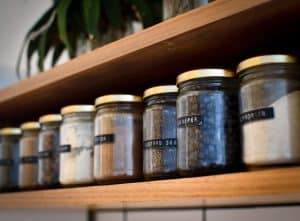 When the snow and ice storms hit San Antonio, TX, it was just another reminder to each citizen to keep their pantry, filled with essentials. If you’re trapped in your home for a week, do you have enough food to keep you and/or your family fed? How healthy is your stash? Having a full stock of healthy foods also helps you eat healthier because you’ll be more likely to use these for meals.
When the snow and ice storms hit San Antonio, TX, it was just another reminder to each citizen to keep their pantry, filled with essentials. If you’re trapped in your home for a week, do you have enough food to keep you and/or your family fed? How healthy is your stash? Having a full stock of healthy foods also helps you eat healthier because you’ll be more likely to use these for meals.
Lentils and dried beans have been staples for thousands of years.
If you know a prepper, you probably realize how important they are in the event of a disaster. Dried beans keep for approximately 10-years when carefully stored. Dried beans aren’t a go-to item if you need something to eat immediately, but canned beans can be a good source of protein and very quick to prepare. Beans are high in zinc, iron, potassium, fiber and folate, while low in fat. They’re relatively inexpensive and a lower cost source of protein.
Nuts, seeds, and whole grains are also easy to store.
This category fits everything from quinoa and brown rice to walnuts. They have a longer shelf life when stored properly. You can even freeze nuts in wide-mouth Mason jars to extend their useful lifespan from four months to up to two years. Do you want to make a gelatin dessert healthier? Toss in some fruit, celery (for the crunch), and walnuts. If nuts are staples in your cupboard, you’ll always be prepared. Whole grains can provide the basics for bread. You can sprout it or put it in a food processor or blender. When frozen, whole grain can last up to a year. The latest craze is making whole grain, sprouted, or Ezekiel bread. Once you make it at home, you’ll never opt for the store-bought type.
Fresh fruits and vegetables taste delicious, but they don’t have a long shelf life.
If you’re stocking your pantry or freezer, canned or frozen fruits and vegetables are good choices. Even though the fresher fruits and vegetables taste delicious, especially if you just picked them off the vine, they don’t keep very long. Having canned or frozen options in your pantry will provide the necessary nutrients for a side dish, soup, or casserole. Frozen or canned tomatoes may not be good for a salad, but they make delicious chili and pasta sauce.
- Proper storage extends the shelf life of some fresh vegetables and fruit. Winter squash, such as spaghetti squash, onions, beets, garlic, potatoes, and apples keep for quite a while in a cool place.
- Keep yogurt in the fridge as a substitute for sour cream or for an instant dessert when combined with fresh fruit and nuts. It has a shelf life of three weeks when stored properly.
- Herbs, spices and vinegar should be on your list of staples. Vinegar can mean all types of vinegar, including apple cider, wine, balsamic and distilled vinegar, which is good for household cleaning and disinfecting.
- Other staples include healthy oils, like coconut oil, frozen meat, poultry or fish, fermented foods, and eggs. You can keep frozen meat for up to a year and frozen fish, for up to five months. You can even freeze eggs to extend their shelf life.
For more information, contact us today at Iron Fit San Antonio
